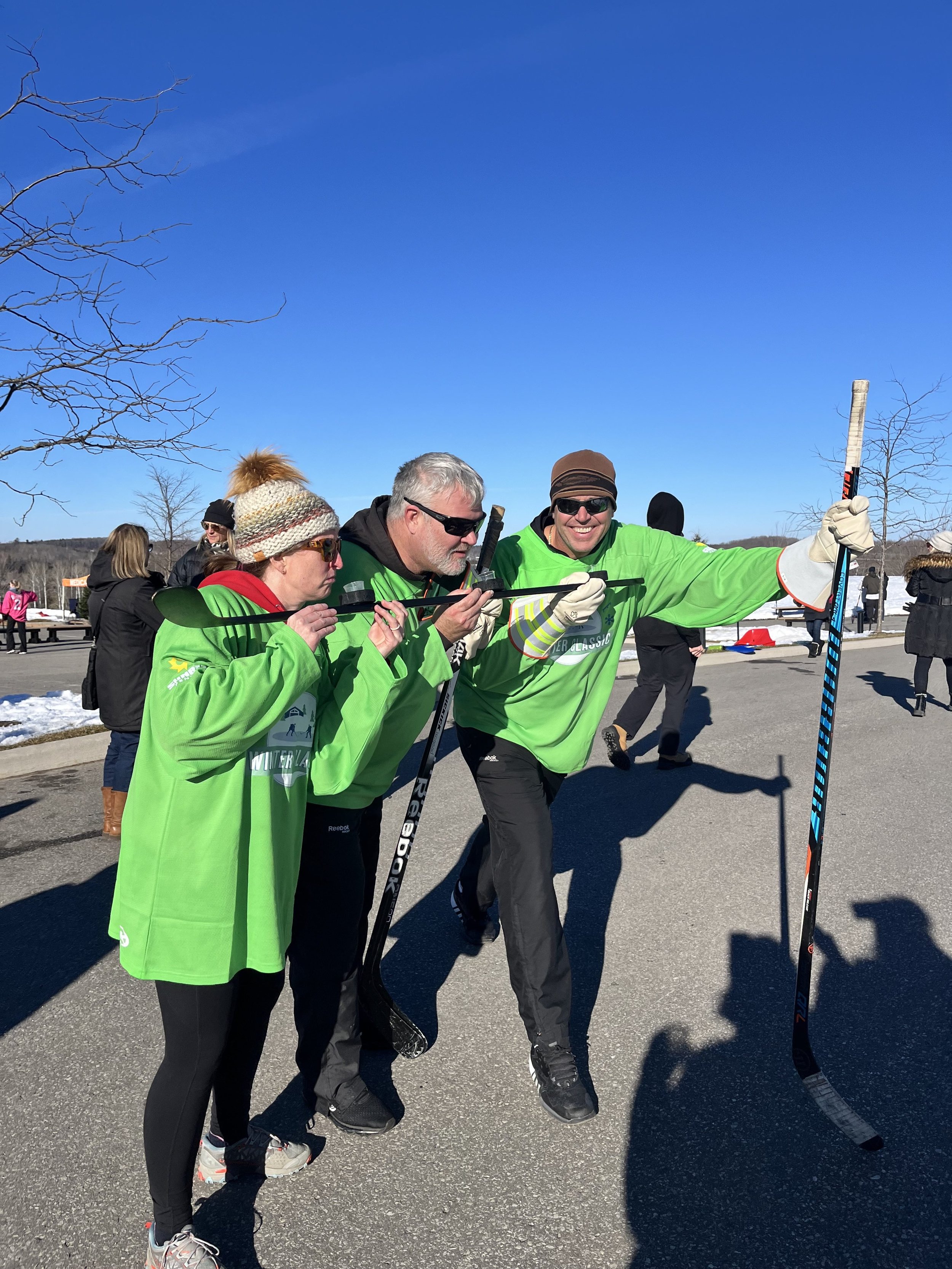Military Zones, Blue Zones, and Soldiering On
We had to play the 3rd annual Braestone Winter Classic Charity Pond Hockey Tournament sans étang.
Mother Nature forced the Organizing Committee to call an audible and shift action from slushy ice to the asphalt of the Braestone Club parking lot.
But on the day in question, we were graced with sunshine, a cloudless sky, and a record number of supporters (the complimentary poutine bar may have helped). The energy could not have been more positive as together we raised more than $154K for our regional cancer centre.
Members of Markle’s Sparkles downing pre-game shooters…
I am fortunate to play old-timer’s hockey a few times a week with a happy cohort of aging shinny enthusiasts. And while finesse is not a word to describe my game I, nonetheless, make my way around the rink with a wee bit of pep.
But let me be clear about this: road hockey is a young man’s game. I played tonnes of it in my youth with Les and Cookie and Frank and Joe on Indiana and Dunham Street. We were Sittler, Keon, and Palmateer – returning home with scraped knees and war stories.
My biggest rediscovery at the modified Braestone Classic? There’s no coasting in road hockey – none at all – and this removes a core element of my game. The starts and stops on pavement are painful and absolute. Case in point: the imminent loss of a black toenail on my left foot.
The highlight of the day: I am speechless when Kent and Leslie (old high school mates) show up. They drive all the way from Kingston to cheer us on. Truth is, the cause has special meaning for Kent and Leslie. Their son, Dylan, fights the good fight – a recent cancer diagnosis.
Leslie and Kent show up - and I am speechless…
Leslie is a mover and shaker – organizer and figure skater – while Kent retired from the Canadian Army not long ago. If Canadian troops were deployed in an uncomfortable zone somewhere on the planet over the past 35 years – Kent was there. Because that’s what soldiers do. They serve.
Just prior to the tournament, I have a long chat with their son, Dylan, on the phone.
To be diagnosed with stage 4 cancer at age 27 is more than a disruption.
“I had to stop working. That was hard. I was at a game shop – and I really loved it,” says Dylan.
I share with him a story of his father and me designing a board game back in high school.
Dylan is pleased to learn his father is more of a nerd than he lets on.
“If so,” I tell him, “That’s my influence. I think I was a nerd before it was cool.”
A nerdy board game
I ask Dylan what he’s going through.
“When you get a cancer diagnosis – you become part of a community – doctors, nurses, my girlfriend who is a cancer researcher at Queen’s – you become part of this community – whether you like it or not.”
I ask what he does to maintain positive energy.
“I let go of what I can’t control,” Dylan explains. “I stepped back from a lot of social media stuff. I stopped following a lot of things. I’m not doomscrolling anymore.”
I tell him that his stance strikes me as very brave.
Dylan brushes that off and reveals remarkable selflessness. “I don’t see bravery. I just don’t want to see my condition – what I’m going through – to hurt others.” And he changes the subject to his mom, Leslie, who has been his advocate and defender – navigating the ins and outs of a challenging treatment plan.
“She’s my General, my Chief of Staff, my recce team, my comms team. She’s a one-woman army.”
I conclude there’s more than one soldier that serves in this family.
Dylan
Several days after the tournament, we’re at a gathering of friends and neighbours. Thoughtful conversation. Tasty snacks. Good drink. There’s a warm and convivial vibe.
Conversation skips from topic to topic until someone brings up Blue Zones, which makes sense, as none present can claim to not having raced through summer to find ourselves in the autumn or winter of our lives.
“Netflix has a series on the topic. Live to 100: Secrets of the Blue Zones – it’s about these special areas in the world where diet and lifestyle lead to the longest lives.”
An animated discussion ensues as we learn the secrets of these regions that increase the likelihood of living as old and comfortably as possible. It appears the devil is in the details: leafy greens, climbing hills and stairs, lots of fish, regular naps, alcohol is okay – but always in moderation, miniscule servings of meat, and plenty of socializing…
We head home, I turn to Sue, and tell her the topic leaves me feeling rather empty.
“I’m not against the notion of staying healthy – and I’m not looking to check out anytime soon – insofar as I control the matter – but if all we’re focused on is living as long as possible – what’s it all about? Is the great measuring stick of a human life longevity, comfort, and well-being?”
Could our sights be set any lower?
Are we not called to serve something bigger than ourselves?
Soldier on Dylan, Leslie, and Kent.
“A man who is good for anything ought not to calculate the chance of living or dying; he ought only to consider whether in doing anything he is doing right or wrong – acting the part of a good man or of a bad.” Plato






